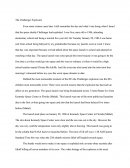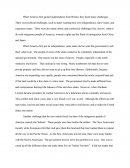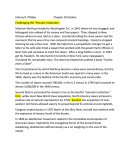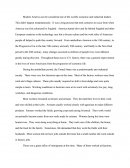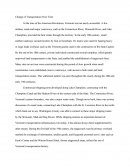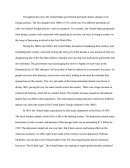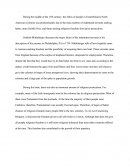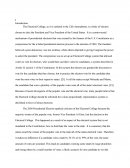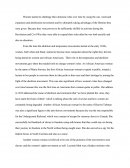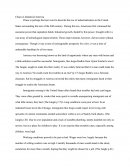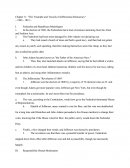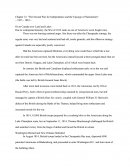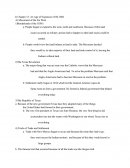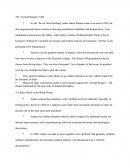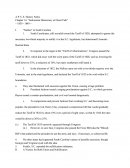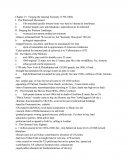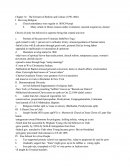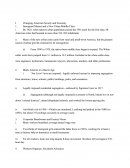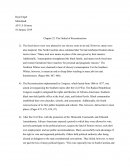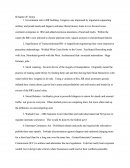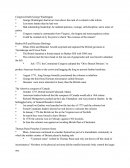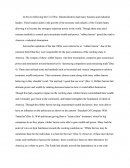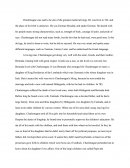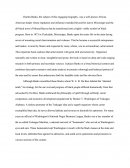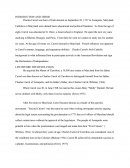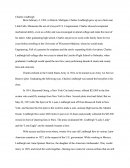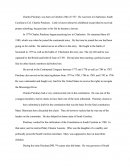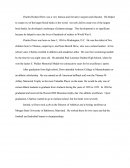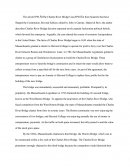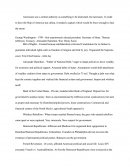American History
There are many popular essays and research papers on American History on Essays24.com.
You can view research papers and essays or use search engine.
4,233 American History Free Essays: 781 - 810
-
Challenger
The Challenger Explosion Even some sixteen years later I still remember the day and what I was doing when I heard that the space shuttle Challenger had exploded. I was five years old in 1986, attending elementary school and being a normal five year old. On Tuesday January 28,
Rating:Words: 1,521 • Pages: 7 -
Challenges Of The New America
When America first gained independence from Britain, they faced many challenges. There were political challenges, such as states wanting their own independence, slave issues, and expansion issues. There were also many ethnic and economical challenges like, slavery, what to do with indigenous people of America, women's rights and the flood
Rating:Words: 650 • Pages: 3 -
Challenging the Peculiar Institution
Johnny R. Phillips Chapter 10 Outline Challenging the “Peculiar Institution: Solomon Northup headed to Washington D.C. in 1841 where he was drugged, and kidnapped also robbed of his money and free papers. Then shipped to New Orleans where he was sold as a slave. Constantly telling the slave owner and
Rating:Words: 329 • Pages: 2 -
Change In Life From Antebellum To The New Deal
Modern America can be considered one of the world's economic and industrial leaders. This didn't happen instantaneously. It was a long process that took centuries to occur from when America was first colonized by England. America started slow and far behind England and other European countries in the technology race
Rating:Words: 1,416 • Pages: 6 -
Change Of Transportation
Change of Transportation Over Time At the time of the American Revolution, Vermont was not easily accessible. A few military roads and major waterways, such as the Connecticut River, Winooski River, and Lake Champlain, provided the best routes through the territory. In the early 18th century, small earthen roadways carried
Rating:Words: 914 • Pages: 4 -
Changes In Us Foreign Policy Between 1880 And 1910
Throughout the years, the United States government had made drastic changes in its foreign policies. The few decades from 1880 to 1910, which saw five different presidents all with very distinct foreign policies, were no exception. As a country, the United States progressed from being a country only concerned with
Rating:Words: 1,180 • Pages: 5 -
Changing Demographics
During the middle of the 17th century, the influx of people in Great Britain's North American Colonies was predominantly due to the mass number of indentured servants seeking better, more fruitful lives, and those seeking religious freedom from prior persecution. Gottlieb Mittleberger discusses the major factor of the indentured servants
Rating:Words: 276 • Pages: 2 -
Changing The Electoral College
I Introduction The Electoral College, as it is outlined in the 12th Amendment, is a body of electors chosen to elect the President and Vice President of the United States. It is a controversial mechanism of presidential elections that was created by the framers of the U.S. Constitution as
Rating:Words: 4,988 • Pages: 20 -
Changing Women's Roles
Women started to challenge their domestic roles over time by using the war, westward expansion and abolitionist movements and by ultimately taking advantage of the liberties they were given. Because they were proven to be sufficiently skillful in activites during the Revolution and Civil War they were able to expand
Rating:Words: 1,569 • Pages: 7 -
Chaos In Industrial America
Chaos in Industrial America Chaos is perhaps the best word to describe the rise of industrialization in the United States surrounding the turn of the 20th century. During this era, Americans first witnessed the awesome power that capitalism holds. Industrial growth, fueled by this power, brought with it a vast
Rating:Words: 883 • Pages: 4 -
Chapter 11
Chapter 11: "The Triumphs and Travails of Jeffersonian Democracy" ~ 1800 - 1812 ~ I. Federalist and Republican Mudslingers 1. In the election of 1800, the Federalists had a host of enemies stemming from the Alien and Sedition Acts. 2. The Federalists had been most damaged by John Adams' not
Rating:Words: 2,048 • Pages: 9 -
Chapter 12
Chapter 12: "The Second War for Independence and the Upsurge of Nationalism" ~ 1815 - 1824 ~ On to Canada over Land and Lakes Due to widespread disunity, the War of 1812 ranks as one of America's worst fought wars. There was not burning national anger, like there was after
Rating:Words: 2,560 • Pages: 11 -
Chapter 12
I) Chapter 12: An Age of Expansion 1830-1860 A) Movement of the Far West 1)Borderlands of the 1830's a: People began to expand to the west, north and southwest. Because of this land issues occurred so military actions had to happen so that land issues could be settled. b: People
Rating:Words: 854 • Pages: 4 -
Chapter 13 Outline
The "Corrupt Bargain" 1824 * As the "Era of Good Feelings" under James Monroe came to an end in 1824, the old congressional caucus system or choosing presidential candidates had broken down. Four candidates towered above the others: John Quincy Adams of Massachusetts, Henry Clay of Kentucky, William H. Crawford
Rating:Words: 1,358 • Pages: 6 -
Chapter 14
A.P. U.S. History Notes Chapter 14: "Jacksonian Democracy at Flood Tide" ~ 1830 - 1840 ~ I. "Nullies" in South Carolina 1. South Carolinians, still scornful toward the Tariff of 1828, attempted to garner the necessary two-thirds majority to nullify it in the S.C. legislature, but determined Unionists blocked them.
Rating:Words: 1,960 • Pages: 8 -
Chapter 15
Chapter 15: Forging the national Economy (1790-1860) I. The Westward Movement a. USn marched quickly toward west( very hard w/ disease & loneliness) b. Frontier people were individualistic, superstitious & ill-informed II. Shaping the Western Landscape a. westward movement molded environment -tobacco exhausted land *& moved on, but "Kentucky blue
Rating:Words: 1,259 • Pages: 6 -
Chapter 16
Chapter 16: The Ferment of Reform and Culture (1790-1860) I. Reviving Religion a. Church attendance were regular in 1850(3/4 pop) b. Many relied on Deism (reason rather revelation); rejected original sin, denied Christ's divinity but believed in supreme being that created universe c. Puritans of the past now-Unitarian faith(New Eng.)
Rating:Words: 1,131 • Pages: 5 -
Chapter 20 Outline Of The Enduring Vision
I. Changing American Society and Economy 1. Immigrant Masses and a New Urban Middle-Class i. By 1920, when nation's urban population passed the 50% mark for the first time, 68 American cities had boosted to more than 100, 000 inhabitants ii. Many of the new urban cities came from
Rating:Words: 492 • Pages: 2 -
Chapter 22: The Ordeal of Reconstruction
Ryan Engel Mittelstadt AP U.S. History 10 January 2019 Chapter 22: The Ordeal of Reconstruction 1. X 2. The freed slaves were very pleased to see slavery come to an end. However, many were also skeptical. One North Carolina slave estimated that "he had celebrated freedom about twelve times." Many
Rating:Words: 465 • Pages: 2 -
Chapter 26 Terms
hChapter 26 Terms 1. Government role in RR building- Congress was impressed by arguments supporting military and postal needs and began to advance liberal money loans to two favored cross- continent companies in 1862 and added enormous donations of land and tracks. Within the routes the RR's were allowed to
Rating:Words: 540 • Pages: 3 -
Chapter 8 American Pageant Outline
Congress Drafts George Washington * George Washington had never risen above the rank of a colonel in the militia * Lost more battles than he had won * Had outstanding leadership, he radiated patience, courage, self-discipline, and a sense of justice * Congress wanted a commander from Virginia , the
Rating:Words: 1,540 • Pages: 7 -
Characterization of Robber Barrons Dbq
In the era following the Civil War, Industrialization had many business and industrial leaders. These leaders aided in the growth of the economy and industry of the United States, allowing it to become the strongest industrial power in the world. Though these men used extreme methods to control and
Rating:Words: 682 • Pages: 3 -
Charlemagne
Charlemagne was said to be one of the greatest medieval kings. He was born in 742, and the place of his birth is unknown. He was German blooded, and spoke German. He shared with his people many strong characteristics, such as, strength of body, courage of spirit, and pride
Rating:Words: 678 • Pages: 3 -
Charles Banks
Charles Banks, the subject of this engaging biography, was a well-known African American leader whose reputation and influence extended beyond his native Mississippi and the all-black town of Mound Bayou that he transformed into a highly visible symbol of black progress. Born in 1873 in Clarksdale, Mississippi, Banks spent his
Rating:Words: 302 • Pages: 2 -
Charles Carrol Of Carrolton
INTRODUCTION AND THESIS Charles Carrol was born of Irish descent on September 20, 1737 in Annapolis, Maryland. Catholics in Maryland were denied basic educational and political freedoms. So from the age of eight, Carrol was educated at St. Omer, a Jesuit school in England. He spent the next six years
Rating:Words: 871 • Pages: 4 -
Charles Lindbergh
Charles Lindbergh Born February 4, 1902, in Detroit, Michigan, Charles Lindbergh grew up on a farm near Little Falls, Minnesota the son of a lawyer/U.S. Congressman. Charles showed exceptional mechanical ability, even as a child, and was encouraged to attend college and make the most of his talent. After graduating
Rating:Words: 802 • Pages: 4 -
Charles Pinckney
Charles Pinckney was born on October 25th of 1757. He was born in Charleston, South Carolina to Col. Charles Pinckney. Little is known about his childhood except that he received proper schooling, because later in his life he became a lawyer. In 1779 Charles Pinckney began practicing law in Charleston.
Rating:Words: 658 • Pages: 3 -
Charles R. Drew
Charles Richard Drew was a very famous and innvative surgeon and educator. He helped to create two of the larges blood banks in the world. not only did he create two of the largest bood banks, he developed a technique of plasma storage. This development is so significant because he
Rating:Words: 277 • Pages: 2 -
Charles River Bridge Case
The article “The Charles River Bridge Case,” from Quarrels that have Shaped the Constitution, Revised Edition, edited by John A Garraty, Harper & Row, the author describes Charles River Bridge decision espoused newly popular Jacksonian political beliefs, which favored free enterprise. Arguably, the case altered the course of economic Jurisprudence
Rating:Words: 919 • Pages: 4 -
Chatper 10 Precis
Americans saw a central authority as something to be distrusted, but necessary. In order to have the Ship of America stay afloat, it needed a captain which would be brave enough to face the storm George Washington - 1789 - first unanimously elected president. Secretary of State: Thomas Jefferson, Treasury:
Rating:Words: 885 • Pages: 4
